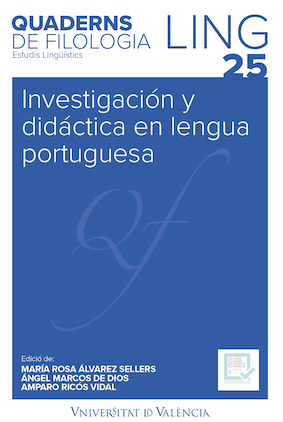L'acte ilocutori de queixa en la pragmàtica interlingüïstica: estudi de cas
DOI:
https://doi.org/10.7203/qf.0.19077Paraules clau:
interllengua, actes ilocutoris, denúncia, portugués com a llengua estrangera Resum
Resum
S'analitza l'acte ilocutori de denúncia en els estudiants de portugués com a llengua estrangera (PLE) de llengua materna espanyola en tres nivells de competència lingüística. L'acte de denúncia es descriu mitjançant: i) la identificació de la informació semàntica (Murphy & Neu, 1996); ii) la descripció de les tendències dels assoliments en relació amb el grau d'amenaça (Olshtain & Weinbach, 1993); i iii) la posada en relleu dels principals mecanismes lingüístics. Les dades permeten traure algunes conclusions: i) el context formal i informal presenten fórmules semàntiques diferents; ii) la "distància social" i el "poder" condicionen les eleccions lingüístiques; iii) la primacia de les estratègies de cortesia en el context formal i l'absència en el context informal.
 Descàrregues
Descàrregues
Descàrregues
Publicades
Com citar
-
Resum636
-
PDF (Español)413
Número
Secció
Llicència
 Este obra está bajo una licencia de Creative Commons Reconocimiento-NoComercial-SinObraDerivada 4.0 Internacional.
Este obra está bajo una licencia de Creative Commons Reconocimiento-NoComercial-SinObraDerivada 4.0 Internacional.
Tots els documents inclosos a OJS són d'accés lliure i propietat dels seus autors i/o institucions editores, i per tant, qualsevol acte de reproducció, comercialització, comunicació pública o transformació total o parcial necessita el consentiment exprés i escrit d'aquests.
Authors who publish with this journal agree to the following terms:
- Authors retain copyright and grant the journal right of first publication with the work simultaneously licensed under a Creative Commons Attribution License that allows others to share the work with an acknowledgement of the work's authorship and initial publication in this journal.
- Authors are able to enter into separate, additional contractual arrangements for the non-exclusive distribution of the journal's published version of the work (e.g., post it to an institutional repository or publish it in a book), with an acknowledgement of its initial publication in this journal.
- Authors are permitted and encouraged to post their work online (e.g., in institutional repositories or on their website) prior to and during the submission process, as it can lead to productive exchanges, as well as earlier and greater citation of published work (See The Effect of Open Access).



